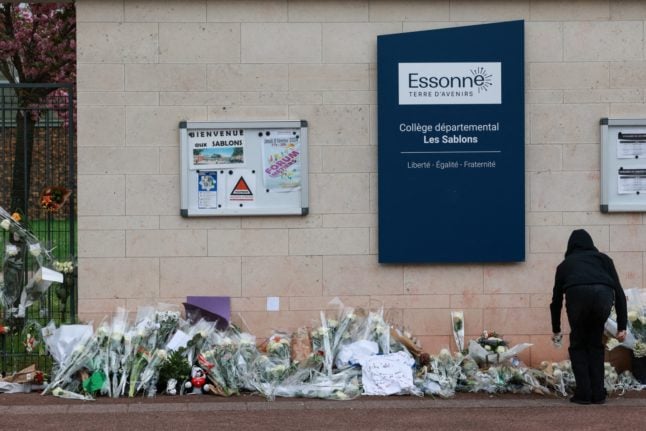A 15-year-old boy has died following an assault by fellow pupils outside his school in Essonne, greater Paris, while two teenage girls were seriously hurt in violent attacks in Montpellier and Tours. These shocking cases have driven the twin topics of bullying and violence in France’s educational establishments to the top of the political agenda.
An inter-ministerial plan is due to be announced in a few weeks to combat violence in schools, with a number of ideas on the table, including a possible ban on mobile phones and ‘disciplinary councils’ starting in primary school.
But, and despite public perception, figures show that violence in schools is actually falling, according to Franceinfo.
READ ALSO OPINION: No, France is not suffering from an unprecedented wave of violence
Serious incidents
French President Emmanuel Macron warned of ‘uninhibited’ teenage violence after a 15-year-old boy died of his injuries following an attack by fellow pupils near his school in Essonne in early April. It seems that the attack was the result of personal and family disputes.
Reports of serious incidents in educational establishments in 2022-2023 were up slightly compared to the previous year, according to an annual report by the Direction de l’évaluation, de la prospective et de la performance (Depp) in February.
On average, 13.7 “serious incidents” per 1,000 pupils were reported in collèges and lycées in 2022-2023, compared with 12.3 the previous year.
Vocational lycées had the highest rate (20.2 per 1,000), followed by collèges (15.8 per 1,000). In nursery, elementary and primary schools, the number of reports reached 4.6 “serious incidents” per 1,000 pupils in 2022-2023, compared to 3 per 1,000 the previous year.
Some eight percent of all serious incidents in middle and high schools are motivated by racism, anti-Semitism, xenophobia or homophobia, the figures show, double the number reported the previous year.
READ ALSO Testing, maths boost and school uniforms: France plans changes to education system
The term “serious incidents” is a broad church, and covers law-breaking, carrying a knife, theft, alcohol or drug abuse and physical violence.
According to the survey, verbal violence accounted for the largest proportion of reports in 2022-2023 (43 percent of all incidents, in schools and collèges).
Physical violence accounted for 40 percent of reports in schools, but only 24 percent in collèges and lycées, where law-breaking was more frequently reported than in establishments catering for younger children (18 percent compared to 7.4 percent).
READ ALSO What you need to know if your child is starting school in France
But part of the reason for the rise is down to a government-mandated insistence that incidents are properly and fully reported to the Ministry of Education to avoid accusations that the government is “sweeping the issue under the carpet”, according to researchers.
They point to the rise in the number of cases of sexual assault going to court at the height of the #MeToo movement – a result, they argued, of the number of women reporting attacks, rather than an increase in attacks.
Primary schools
The overwhelming majority of children in their final two years of primary school (those aged nine or 10) reported that their impressions of life at school were ‘good’ or ‘very good’, according to the only study on bullying to date, carried out in March 2022.
A total 36.5 percent of those surveyed said they had been involved in physical fights, and 32 percent said that pushing and shoving in the playground was an issue, while 41.9 percent had been the victim of insults, and 41.1 percent reported being isolated by others.
Collèges
More studies have been carried out in France’s collèges than in primary schools, so the picture here is much clearer – and it shows a drop in physical violence in 2023, compared to earlier studies in 2022 and in 2017.
Fewer than three in 10 students (28 percent) said they were pushed around in 2022 (compared 34 percent in 2017); 15 percent said they had been hit in 2022, down from 19 percent in 2017; and 15 percent say they were involved in at least one group fight (a fall of one percentage point compared to 2017).
READ ALSO How France will crackdown on the scourge of school bullying
On the other hand, four percent of respondents to the 2022 survey said they had been hurt by a weapon or dangerous object, up from three percent in 2017; while sexual assaults remained steady at six percent.
Pupils in 6eme and 5eme reported being victims of physical violence more than older students.
Crucially, however, while 91 percent of students say they feel safe in the school grounds, that figure drops to 75 percent of all students – and 71 percent of female students – outside the gates.
Cyberbullying
The results of the latest survey on cyberbullying have yet to be published – studies in 2015 and 2018 showed an increase in instances of humiliating videos, photographs, or rumours being posted online. The comparison with 2023’s results will be interesting when it becomes available.
Violence against staff
Again, despite high-profile cases, physical violence against teachers and school staff remains rare. Studies in 2022 showed that 98 percent of staff in schools have never been hit, though 40 percent did report being the victim of verbal abuse.



 Please whitelist us to continue reading.
Please whitelist us to continue reading.
Member comments